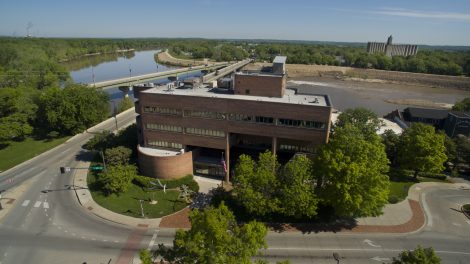Lawrence City Commission defers action on new comprehensive plan that includes controversial growth policy

photo by: Nick Krug
Lawrence City Hall, 6 E. Sixth St., is pictured on May 3, 2016.
City leaders have deferred action on the proposed Lawrence-Douglas County comprehensive plan in order to further discuss a new growth policy that some think could increase the cost of housing.
As part of its meeting Tuesday, the Lawrence City Commission voted unanimously to defer the adoption of Plan 2040 on second reading. The plan has a new growth policy that prioritizes infill development and adds requirements for developers who want to expand the city’s boundaries.
As currently proposed, the plan includes a requirement that developers provide some kind of community benefit if they want to annex land to expand the city. That idea has been controversial with some local business groups. As part of the meeting Tuesday, some commissioners also questioned whether every annexation should have to provide a community benefit.
Specifically, the proposed policy states that the development must both meet a market demand and provide a community benefit. Commissioner Matthew Herbert suggested that the policy be amended so that meeting either one of those criteria is sufficient to annex new land. Herbert noted that the city has a low inventory of residential lots and will likely need to expand its borders to meet needs in the next few years.
“And from my perspective, being completely out of residential developable land and then therefore annexing some in to create developable land is a community benefit because it reinvigorates the market,” Herbert said. “It allows development to occur, it allows a supply to exist; it allows supply-and-demand economics to work in the favor of the community as opposed to against it.”
Commissioner Leslie Soden said she was OK with the policy clearly indicating what land qualifies for annexation. Soden said she disagreed with Herbert’s suggestion to loosen the language of the policy, as she thinks more open policies and the turnover of commissioners has resulted in a lack of guidelines in the past.
“So to me this is a more formal way of saying that it’s not that we are against annexation but we have things that we want to see before we do that,” Soden said.
Vice Mayor Jennifer Ananda, an attorney and social worker, also questioned the wording of the annexation requirements, but for different reasons. Under state law, Ananda noted, the commission essentially has full discretion on whether to annex land, and the policy wouldn’t legally bind the commission to approve or deny certain annexation requests. Ananda said that as currently written, the policy doesn’t make it clear that the commission can break from the policy at its discretion.
“We don’t say that here, anywhere,” Ananda said. “And that has been the root of the difficulty for me in discussing this.”
Mayor Lisa Larsen and Commissioner Stuart Boley said they wanted the policy to require a community benefit, but that they shared Ananda’s concerns that the policy didn’t clearly state that the commission has the final say on annexations.
Ultimately, Ananda suggested, and the commission generally agreed, that the growth policy should unequivocally state that the city may annex land at its discretion. Ananda suggested that the policy could then indicate that the commission, in making that decision, will consider whether an annexation is meeting a demand and providing a community benefit. In addition, Ananda suggested that the definition of a community benefit be broader and include “future priorities of the commission,” since commission priorities will change over the 20-year lifespan of the plan.
The current version of the plan lists several potential community benefits that developments could provide, including affordable housing; employment; preservation or provision of land; or the construction of amenities or facilities for a public purpose. The plan notes that developers may request incentives to offset the cost of providing a community benefit, but that the city would not be required to grant those incentives.
The Lawrence Board of Realtors, Lawrence Home Builders Association and the local chamber of commerce have all expressed concerns about the annexation requirements, particularly the community benefit requirement, saying it could make both new and existing housing more expensive.
Planning and Development Director Scott McCullough said that the point of the policy was not to make development difficult, but to ensure collaboration between developers, the city and other partners in the community as the city grows.
“We know that schools and parks and utilities and other service providers all have to be a part of annexing property and building our community out from its borders,” McCullough said. “And so, it’s not meant to harm any development; it’s meant to collaboratively build neighborhoods and community together, and get us all thinking in that direction.”
Given the changes to the wording of the policy that the commission suggested, McCullough recommended that the commission defer adopting the plan so that city staff could bring back a new version of the policy for consideration as part of the commission’s next meeting.
Plan 2040 will replace Horizon 2020 and covers land use in the city of Lawrence and the unincorporated areas of Douglas County. Once the commission adopts the plan, it will move to the County Commission for review. Changes made by either body go back to the Planning Commission.
City Commission Meeting 09/03/19







